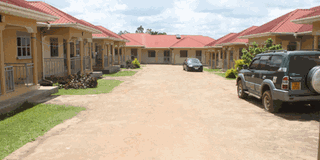Gulu Town ripe for real estate investment

One of the few estates in the area located at St Mauritz in Gulu Municipality. PHOTO BY POLYCAP KALOKWERA.
What you need to know:
- City status comes with rapid growth in population, business and investment opportunities. Gulu City is no exception. The demand for housing is at an all time high.
Real estate is the fastest and most lucrative long term investment in Uganda and any promising city can reap from it.
Leaders, planners, and policy makers in cities and urban regions are increasingly recognising the accelerated pace of urban development, and in particular the challenge of spiraling demand coupled with supply-side constraints something that Gulu is grappling with.
According to World Population Review 2019, Gulu is the second largest populated city in Uganda with more than 146, 858 after Kampala City which is at more than 1,353,189.
Gulu is among the nine municipalities that were elevated to city status after Cabinet approval in May and it started operating in July 2020.
Investment opportunities
Developments that come with city status will soon create job opportunities from people in and out of Gulu. This means an increase in demand for housing.
Ronnie Brooklyn of the chief executive officer of Gang Mega Housing and Ronnie Okori, the property manager, say real estate business in Gulu is still untapped because people are still hesitant to invest in it.
“The irony we have here is many investors in Gulu are scared to invest in real estate citing the payback period of the investment yet demand for housing has been good. Home prices increased between 5 per cent and 10 per cent in the past year, not too little, not too much, but home prices are a marker of demand for both houses and rental properties,” Okori says.
Okori notes that many investors have resorted to building hotels and lodges creating a big gap and crippling the housing and accommodation capacity of Gulu.
He adds that, “With real estate business, you will never go wrong, unfortunately, only few risk takers in Gulu understand this,”
Land for sale
Gulu municipality mayor, George Labeja says there is land in Gulu for development and that owners are willing to sell but there are very few serious buyers.
“There is plenty of land for sale. 15x30 metres costs between Shs50m and Shs300m depending on proximity to the city centre,” Labeja says.
“In Koro and Abuga about nine to 10 kilometers from the town centre, an acre of land for instance, 50x100 meters is being sold at shs30m and some are cheaper than that. This is an opportunity for an investor in real estate since in five to 10 years many will prefer to rent apartments out of town,” Mr Labeja adds.
George Lapir Aligech, the president of Gulu Development Forum says a few people have tried to invest in real estate in Gulu but they still can’t match the rising demand.
“We have many dilapidated houses in and out of town and a few middle-class estates that we fear may not be able to accommodate the influx of people,” Aligech says. Aligech adds that Gulu City lacks adequate housing to provide what he described as top-notch estates to meet the taste and preference of the high class corporates who could relocate to Gulu for work.
Nancy Adong, a businesswoman in Gulu Town, says it is difficult to find houses for rent in Gulu and that some people especially working youth without families have resorted to sharing rooms.
Housing Deficit
The Uganda National Housing Policy of May 2016 dubbed “adequate housing for all” acknowledged that there is inadequate housing in terms of quality and quantity with a housing deficit of about 1.6 million housing units, out of which 210,000 units are needed in the urban areas.
An estimated 900,000 housing units are sub-standard.




